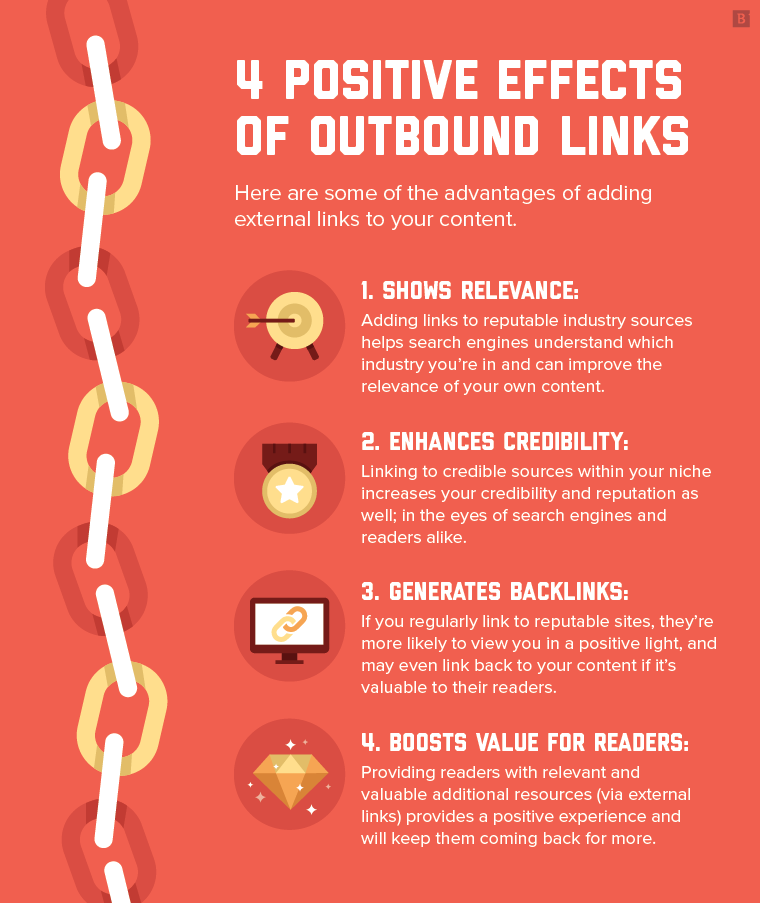Building and earning links are at the core of any SEO strategy.
But have you ever considered why anyone would want to give you a backlink? What’s in it for them? And, more importantly, do you give out links to other websites?
The simple answer is that outbound links do have a positive impact on a website’s rankings and that’s why they should be added, where relevant. But, before we get into the nitty-gritty details, let’s first look at what outbound links are.
What Are Outbound Links?
The links to external sites from your website are called outbound links. Also known as external links, they direct people away from your website — sending traffic externally to another. Similarly, inbound links are the backlinks that point people from other websites to yours. Both an outbound link and an inbound link are extremely helpful for website ranking, but you can only truly control your own outbound links.
You can add such links to provide a reference for facts, studies or statistics. Outbound linking to the original study, for instance, adds more credibility to your content. For example, if you write content about the growth of the human population in the United States, you might want to reference and link to the U.S. Census Bureau to back up the information you’ve written about.
You may also need to add external links if you have taken images or quotes from another website and need to give credit. It’s a matter of citation and journalistic best practice.
On top of credibility and proper recognition of information, outbound links also help with search engine optimization (SEO). By linking out to an authoritative source, you can help crawlers go through and rank your site. But the type of outbound link does matter when it comes to ranking.
Types of Outbound Links
There are basically two types of outbound links: nofollow and dofollow (aka follow).
Dofollow/Follow Links
Any link that you add to your site is by default a dofollow link. You have to manually change it to nofollow link if you prefer.
Search engines follow these links when crawling your site. Through these channels – site to site via a link – ranking power, or “link juice,” is transferred.
If you want to give credit to a website, you should use a dofollow link. It’s ethical and fair to give credit where credit is due.
If you want to give credit to a website, you should use a dofollow link. It’s ethical and fair to give credit where credit is due. Dofollow links also act as a vote of confidence: You are granting another site credibility and authority by linking to them.
Nofollow Links
Nofollow links are coded with a rel=“nofollow” tag, which tells search engines not to follow them. This means that these links do not pass on link value to the target webpage. A nofollow link essentially halts search crawlers in their tracks.
So it’s crucial to add nofollow tags to links added by your readers in the comment section, as they could direct search engine crawlers to spammy sites. The search engine will then deem you as less credible, negatively impacting your trust factor.
Paid links, affiliate links and links to product pages should also be nofollow. These links have the potential to generate revenue, so Google requires you to nofollow them by default. Otherwise, you could lose your credibility with the search engine and experience a drop in ranking.
Adding nofollow tags to certain links also helps you maintain crawl prioritization. It helps you direct search engines to the pages that you want them to crawl. You can also prevent them from getting directed to uncrawlable pages like pages that need registration to access.
Positive Impact of Outbound Links
External links to relevant industry sources can have a positive effect on SEO, but only if you do it right. Here are some of the advantages of adding external links to your content.

Shows Relevance
Search engines learn from every aspect of your website, including to whom you link and how. Adding outgoing links to reputable industry sources increases the relevance of your own content.
It helps search engines understand which industry you are in, depending on the kind of sources you link to, which increases your content’s relevance within your specific space.
Enhances Credibility
If you link to sites with high Domain Authority, within your niche, it increases your credibility and reputation as well – from the standpoint of search engines and readers. Association with high Domain Authority websites, even if it is just via outbound links, affects your reputation in a positive manner.
It not only enhances your credibility but it can also improve search rankings. A study by Reboot clearly proves that linking to high-authority sites has a positive correlation with an increase in search rankings.
Outbound links are usually used to link to sources or relevant facts and statistics. Adding such details in your content lends it credibility and proves that your content is accurate and up to date.
Generates Backlinks
If you regularly link to quality sites, they are more likely to view you in a positive light. So when you create content that has some value to their readers, they are also more likely to link back to your site.
It will be easier to get backlinks if you have valuable industry resources and statistics on your website. In other words, you need to make your site linkable. You need something that’s worth linking to, such as an authoritative, exhaustive study or a highly engaging, interactive resource.
It will be easier to get backlinks if you have valuable industry resources and statistics on your website.
Boosts Value for Readers
If your outbound links direct your readers to other relevant resources, it will provide more value to them – they will be happy they clicked on those links. This means that they may be more likely to visit your website again. Or, they will at least view your site in a positive light, as one that provides value to them and makes their lives easier or more interesting in some way.
Also by writing clear, strong anchor text for your hyperlinks, you can more easily communicate exactly what it is that you’re informing readers about. That makes content writing for blogs and landing pages that much more important and valuable.
Subscribe to
The Content Marketer
Get weekly insights, advice and opinions about all things digital marketing.
Thank you for subscribing to The Content Marketer!
Negative Impact of Outbound Links
Outbound links don’t always have a positive effect on SEO. At times, they can be harmful if you’re linking to spammy, low-quality sites or clearly engaging in black-hat linking practices.
Negative outbound link practices include:
Linking to Non-relevant, Spammy Websites
Whenever adding links to your content, ensure that you’re not linking to any second-rate websites. Linking to non-relevant websites will decrease your credibility.
Also, search engines look at the websites that you link to in order to understand what industry you’re in. So, if you link to non-relevant sites or pages, then your page might be incorrectly categorized. This, in turn, will decrease your search rankings for the relevant search queries that you should have ranked for.
Using Link Farms (Two-way Backlinks)
A lot of people ask for links in exchange for links. And they reach out to websites to build link farms. But, what they don’t realize is that search engines can recognize these patterns. If two sites have too many links to and from their websites, then search engines will take notice.
Google’s Panda algorithm update put an end to such mutual linking malpractices and penalized sites that had clearly constructed a nefarious link-building relationship. Don’t ask for links in exchange for links — over and over — because you could be penalized.
Having Too Many Outbound Links
Any site that has too many external links might be considered spammy by search engines.
Also, adding too many outbound links will distract your readers and direct them away from your website. Long-form content may naturally have more external (and internal) links. But if you’re linking several times within paragraphs, then it becomes disruptive. On certain devices, it will definitely ruin the user experience because too many hyperlinks can cause users to unintentionally outbound link click when they were simply trying to scroll further down the page.
Too many outbound links will distract your readers and direct them away from your website.
Best Practices for Adding Outbound Links
Now that we have established that outbound links can have both negative and positive effects on SEO, let’s take a look at how to do it right.
Here are some outbound link best practices:

- Double-check your links before publishing to ensure there are no broken links.
- Use a system like Google Tag Manager that allows you to add and update your own tags for easy conversion tracking and site analytics.
- Don’t forget to add Nofollow links where required.
- For example, you can add nofollow links to your comments section to avoid people from spamming and adding irrelevant links there.
- Use proper anchor text for all external links to inform readers about the type of content you’re linking to. If your anchor text is not relevant to the page that you’re linking to, then it could mislead readers and you will lose credibility.
- Ensure your external links open in a new tab so that your page doesn’t close.
- You can simply add target=”_blank” to your HTML code to ensure that all outbound links open in a new tab.
- Always put an external link to pages that are relevant to the topic being discussed in your post.
Conclusion
Outbound links can have both positive and negative effects on SEO. It all depends on what linking practices and content strategies you’re using.
So, follow the best practices listed in this post and see the results for yourself.
If you know any other tips or tricks for site ranking and linking that worked for you, please share them with us in the comments below.
Editor’s Note: Updated January 2023.





